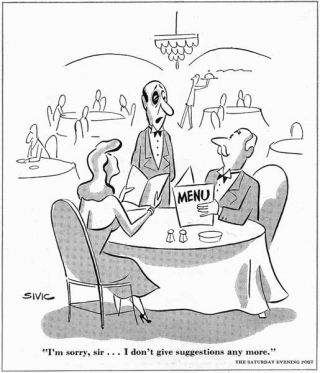
Altruism
‘Brother, Can You Spare a Dime?’
Beware: Songs can open your heart – and your wallet.
Posted February 28, 2013

Tipping in a restaurant isn’t just about the quality of the service. Customers give bigger tips to waiters who compliment them on their food choice and men give bigger tips to waitresses who wear make-up. But our generosity can also be increased by the right song lyrics or briefest message on the check.
In Europe especially, tipping is more optional than it is in the US and often runs to 5-10% rather than the 15-20% expected in the US. Celine Jacob et al tested the influence of the music played during lunch at a busy French restaurant. Two music CDs, each with 15 songs, were prepared. One CD had songs judged to have ‘prosocial’ lyrics while the other had neutral lyrics. These popular French songs were first selected by 281 passers-by and then rated by 95 undergraduate students. Customers listening to the prosocial lyrics left bigger tips.
Just how these prosocial songs affect us has been studied by Greitmeyer et al who tested the effect of songs with prosocial lyrics on the helpfulness of German students. If you’re wondering, as I did, what kinds of songs made the prosocial category, the English songs on Greitmeyer’s list included Michael Jackson’s ‘Heal the World’, Live Aid’s ‘Feed the world’ and, somewhat curiously I thought, ‘Help’ by the Beatles. These were contrasted with the socially neutral Jackson’s ‘On the line’ and the Beatles’ ‘Octopuses Garden’. These tracks might not be top of everyone’s playlist (I doubt that any amount of Michael Jackson would make my husband feel helpful) but as always these songs had been pretested for their power to bring out the prosocial in us. Of the 34 German students who listened to selected tracks, those who listened to the prosocial songs went on to show more empathy, co-operation and helping behaviour. This suggests that the customers in Celine Jacob’s French restaurant left bigger tips because the prosocial songs made them fell more empathic and helpful to the waiting staff.
But how do we know it was the lyrics and not, say the tempo or style of the tracks? Celine Jacob recently tested this by swapping song lyrics for written quotes on the customer’s bill (or check, as our US cousins call it). Five waitresses recorded customer behaviour, including tipping, over weekday lunch hours. Some customer bills carried the altruistic quote ‘A good turn never goes amiss’ from the French writer George Sand. Others had the Latin proverb: ‘He who writes reads twice’, and the remainder had no quote.
The quotes were first given to 20 passers-by who then rated their own level of altruism. Those who had read Sand’s quote were left feeling significantly more altruistic than those who read the Latin proverb. Back in the restaurant, customers, regardless of sex, who got the altruistic quote, gave bigger tips more often than those with the neutral quote or no quote at all.
What struck me was how easily our behaviour can be influenced by such a small, barely noticed message. Think of all the messages that we experience throughout the day, from jingles to bumper stickers. Our motives are constantly being manipulated and we are usually completely unaware that this is happening. As for dining Chez Ragsdale, I’m thinking of making my own dinner playlist.

